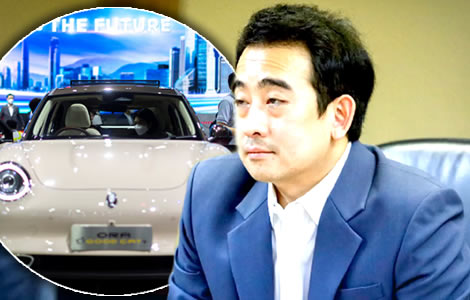Thailand’s Deputy Minister of Finance suggests caution in penalising traditional combustion engine cars. The government is reconsidering its approach to EV taxes, aiming for a balanced strategy that supports the EV market without destabilising the broader automotive sector.
Thailand’s Deputy Minister of Finance Paophum Rojanasakul this week suggested that the government may be recalibrating its massive bet on EV vehicles. It comes as he suggested that a new tax policy penalising powerful traditional combustion engine cars may have to be looked at. At this time, Thailand’s EV sector, after posting stunning growth of over 684% last year, is looking at the prospect that sales in 2024 may be marginally lower than in 2023.

Thailand’s automotive industry is at a crossroads. The government is reconsidering its stance on electric vehicles (EVs) and taxes. Deputy Minister of Finance Paophum Rojanasakul recently revealed that the government plans to implement a new air and sea tax system for cars after 2026.
The proposed system favours electric vehicles (EVs) while imposing higher excise duties on internal combustion engine (ICE) vehicles, particularly on more powerful models and hybrids.
Government aims for a balanced approach to the tax system, focusing on both EV and ICE vehicles’ future
However, Paophum emphasised that the government will proceed cautiously. The goal is to support the growing EV market while maintaining stability in the broader automotive sector.
“A tax structure that leans exclusively towards EVs may not be the answer,” Paophum stated. “We need to balance the entire tax system.”
He added that Thailand’s position will adapt depending on global trends, particularly whether battery electric vehicles (BEVs) or plug-in hybrids (PHEVs) dominate the market.
The Thai government’s reconsideration of the tax system comes amid significant global growth and challenges in the EV industry. EV sales worldwide have increased, with a notable 35% rise in China. Yet, the global shift toward battery-powered vehicles has not been as widespread. Nor has it been as definitive as expected by climate advocates.
In Thailand, EV sales have surged in recent years. In 2023, 76,314 electric vehicles were registered, a dramatic 684% increase from 2022’s 9,729 units. The momentum continued into 2024, with 49,776 EVs sold by August.
However, the pace of growth has slowed, leading to concerns about whether Thailand will meet its original sales targets. The country is now expected to register around 74,664 EVs in 2024, significantly below the earlier forecast.
Despite a slowdown in EV sales, global market remains strong, particularly in China and U.S.
Despite this slowdown, global EV sales remain strong, particularly in China. China’s dominance in the EV market is clear, with over 10 million EVs produced in 2024. However, concerns about overcapacity are rising. For instance, Chinese manufacturers are set to produce four times the amount of batteries needed for domestic demand. Furthermore, state controls over sensitive data relating to EV sales are raising questions.
Similarly, the U.S. EV market faced a dip early in 2024 but showed recovery in the third quarter, with increased production from General Motors and Ford.
The potential introduction of a new tax structure in Thailand will impact both the EV and ICE sectors. Paophum acknowledged that a shift away from traditional ICE vehicles is inevitable, but tax adjustments must be gradual.
“The production lines and supply chains for traditional vehicles are extensive,” he explained. “Sudden tax hikes could destabilise the market, leading to job losses and economic issues.”
Paophum emphasised the need to avoid sudden impacts on the ICE sector, especially considering its economic contribution. The Thai automotive industry, dominated by Japanese manufacturers, employs far more people than the EV sector, which is largely driven by Chinese companies. The government must balance these competing interests carefully.
ICE vehicles emitting higher CO2 levels to face significantly higher excise duties under new tax plan
As part of the proposed tax changes, ICE vehicles emitting more than 200 grams of CO2 per kilometre will face significantly higher excise duties. From 2026 to 2030, these vehicles will be taxed at rates between 34% and 38%.
EVs, which have been taxed at a minimal rate of 2% since 2022, will continue to benefit from favourable taxation policies. Hybrid and plug-in hybrid vehicles (PHEVs), which emit less CO2 but still rely on petrol engines, will also see tax adjustments.
The government’s proposed tax changes aim to encourage the production of low-emission vehicles. However, Paophum remains cautious about shifting too quickly away from ICE vehicles. “The dust has not yet settled in the automotive market,” he noted. “If global trends favour PHEVs, we will adapt. If EVs dominate, we must be ready.”
Thailand’s automotive sector is vital to its economy. While the shift toward EVs could reduce emissions, it raises concerns about economic stability.
ICE vehicles have long been reliable investments for consumers, with second-hand values providing an additional incentive.
However, the current climate surrounding EVs has led to market uncertainty, as potential buyers hesitate to make long-term investments in vehicles that could soon be outdated due to changing regulations.
Market uncertainty reflected in declining car registrations and consumer hesitation
This uncertainty is reflected in a 27% decline in car registrations in 2024. High household debt levels and tightening credit are contributing factors. Together with the shift toward environmentally friendly vehicles, these issues are making car buyers wary of significant purchases.
Globally, the trend toward EV adoption is facing challenges. In Europe, while the share of EVs in new car registrations has risen to 17.3%, overall EV car sales fell by 5.8% in 2024.
This suggests a slowdown in the green transition, partly driven by government regulations targeting emissions.
Similarly, in the U.S., EV sales fell in early 2024 but rebounded in the third quarter. Despite fluctuations, EVs still represent a small portion of global car sales, with ICE vehicles making up over 80% of new car sales worldwide.
Chinese EV industry in Thailand faces a crisis. It is demanding an urgent hearing from the government on its promotions
Thailand changes tack as EV revolution turns into a damp squib with warehouses full of unsold cars
Top Thai insurer says no more new policies for EV cars. Later, it emphasised renewals case by case
Paophum also noted the importance of flexibility in response to changing global trends. He pointed out that the market currently favours hybrid vehicles, which combine a combustion engine with an electric motor.
“If global market conditions favour PHEVs, we can adjust our tax system,” Paophum said. “However, if EVs continue to gain momentum, we must be prepared for further adjustments.”
Thailand’s cautious approach to EV tax changes aims to balance growth with economic stability
Thailand is preparing for a gradual shift in its automotive tax system. The government has committed to implementing the new tax structure after 2026. However, it has now awakened to the reality of the marketplace. The minister simply suggests a balanced approach to avoid major disruptions to the existing automotive sector.
This approach will help ensure that the country’s EV push does not undermine the job market or economic stability. Certainly, at this stage, there is no guarantee that there will be an EV transition as projected by planners.
As the automotive industry evolves, Thailand’s future moves depend on global market demand for EVs. Undoubtedly, it is a risk that Thailand has taken which is not guaranteed to pay off. Indeed, it may have damaged the country’s existing traditional automotive industry.
The government’s later, more cautious approach aims to keep Thailand competitive in a rapidly changing industry while protecting workers and consumers.
Join the Thai News forum, follow Thai Examiner on Facebook here
Receive all our stories as they come out on Telegram here
Follow Thai Examiner here
Further reading:
EV sector crisis as Chinese firms are trapped between lack of demand and government tax penalties
Thailand changes tack as EV revolution turns into a damp squib with warehouses full of unsold cars
Top Thai insurer says no more new policies for EV cars. Later, it emphasised renewals case by case
Lack of coherence in government policy is the root cause of Thailand’s massive economic problems
Disturbing questions that must be confronted over Thailand’s reeling economy are China and EV cars
First-quarter GDP growth surprises analysts based on higher tourism and consumer spending growth


















